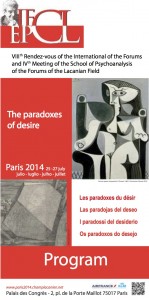Extreme platitude or witticism of the real?
This subject had at first spoken of his father, a man of admirable intelligence but who drank more than was reasonable: an alcoholic. He had then spoken of his beloved, also of admirable intelligence, but who ate more than was reasonable: a bulimic. When invited to say what he did that was more than reasonable, he responded: “I masturbate”. Finally questioned about the person who made that judgement, he concluded, rather uncomfortably, “Well, me …”
Thus he confirmed that for him, as for everyone, the “I” who does and the “I” who says are not always in agreement about what is reasonable, even when they are inseparable … Is this then the paradox of desire, as an essential point of impasse in all hystories, that one can do nothing but speak about. A paradox that would be better for us to accept in the end, so that we can get around it all the better.
Can this confusion be the starting point of another outcome of the analysis, where the cause of desire is recognized in the absolute singularity of its reality as remainder? If the effect is no longer one of joui-sens, the analysand’s relation to desire is changed. Where will that take him? Moreover, isn’t there another paradox in wishing to take up this place of the analyst-remainder? Lacan responded to these questions by changing the status of knowledge, lightened through the laughter that returns to it (cf. Télévision with “gai sçavoir [“gay science”] and “Plus on est de saints, plus on rit” [“the more saints, the more laughter …”][1].
The theme of the approaching Rendezvous will enable us to exchange our points of view on psychoanalysis, which starts with the analysis of symptoms, the paradoxes of desire that are so painful to bear, in order to end in the founding of the desire of the analyst. And to the satisfaction that we release in this subject by unknotting his symptoms in the proper way, we will also add our pleasure in progressing together in the development of this proper way.
Translated by Susan Schwartz
[1] See Television: A Challenge to the Psychoanalytic Establishment. Trans. D. Hollier, R. Krauss, A. Michelson. New York and London, W.W. Norton & Company, pp. 16 and 22.

